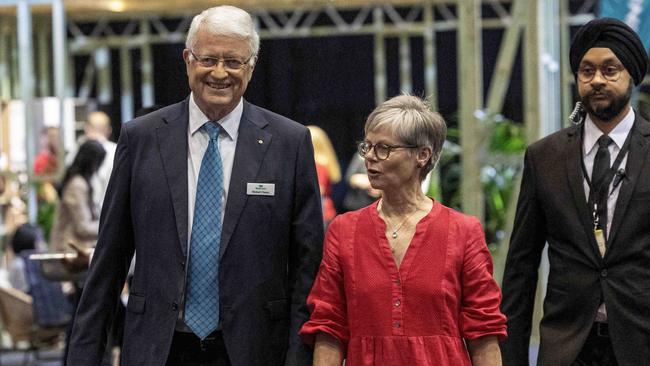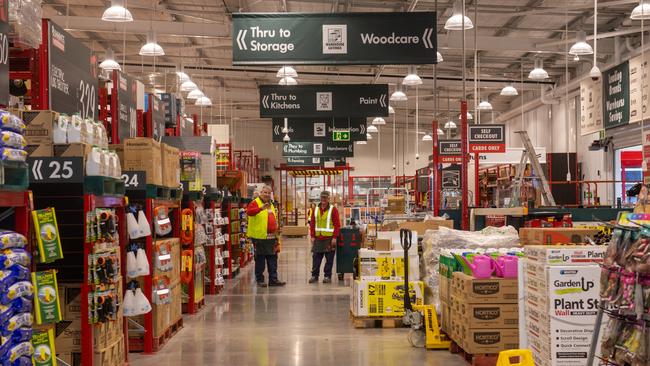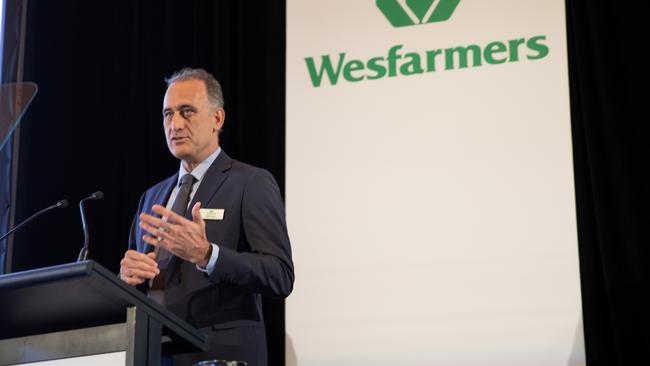Wesfarmers says retail trade holding up at Bunnings, Kmart; hits out at proposed IR laws
Shoppers are shying away from big-ticket purchases at Bunnings as cost of living pressures hit, but trade overall at Wesfarmers’ retail businesses is holding up well.

Wesfarmers chief executive Rob Scott says cautious consumers continue to be wary about making big-ticket purchases at its hardware retail giant Bunnings, opting for smaller outlays on repair and maintenance products, although trading across its key retail brands was holding up in the face of uncertain economic conditions.
Addressing shareholders at the company’s annual general meeting in Perth on Thursday, Mr Scott said elevated inflation and higher interest rates were constricting demand in parts of the economy.
He said households with high levels of mortgage debt relative to income were feeling the greatest pressures, but that Wesfarmers’ stable of retail chains led by Bunnings, Kmart, Target and Officeworks was focusing on value to attract price-conscious shoppers.
“In this environment, the strong value credentials and core everyday offer of our retail businesses position them well to meet changing customer demand, acquire new customers and profitably grow market share,” Mr Scott said in his CEO address.
“Cost of doing business pressures remain elevated, driven by inflation, labour market constraints and wage costs, higher energy prices and a lower Australian dollar. To manage these pressures, Wesfarmers’ larger businesses are continuing to leverage their scale and sourcing capabilities, and all businesses maintain their focus on proactive investments in productivity and efficiency measures.”

Mr Scott said trading performance for the first 16 weeks of the 2024 financial year had generally continued in line with the update provided at the full-year results in August, with larger purchases at its Bunnings stores proving slower while smaller purchases for home repairs were still popular.
“Bunnings’ sales growth remains in line with the second half of the 2023 financial year, with growth in both consumer and commercial segments,” he said.
“While consumers continue to demonstrate a degree of caution in making big-ticket purchases, demand for products that support necessary repair and maintenance and smaller-scale projects remains robust, and Bunnings has seen increased foot traffic to stores through the year to date.”
At the full-year results in August, Mr Scott said Bunnings shoppers were hesitating when it came to “big-ticket purchases” and DIY projects that were more than a $1000 budget.
He told shareholders that strong financial results had continued in Kmart Group, which also operates Target, as the division benefited from the value credentials of its Anko own brand products, which were resonating with an increasingly wide cross-section of households.

“With many customers remaining focused on how to manage ongoing cost-of-living pressures, Kmart is well positioned to extend its low-price leadership and profitably grow its share of customer spending,” Mr Scott said.
Officeworks’ sales for the year to date were broadly in line with the prior corresponding period. The costs of doing business had increased in the year to date, and Officeworks maintained its focus on delivering productivity and efficiency benefits to mitigate those pressures.
Mr Scott said the recently created health division’s sales growth at its Priceline pharmacy banner had been supported by continued demand for health and beauty products, but sales had moderated in the wholesale and Clear Skincare businesses. The divisions’ earnings had been affected by accelerated investment in transformation activities, pharmaceutical benefit scheme changes, and integration costs associated with acquisitions.
In his address to shareholders, chairman Michael Chaney defended the support Wesfarmers had given to the Yes campaign in the voice referendum, which included a $2m donation.
“The board and management were proud to stand up and be counted on that matter, which we saw as important not only to Indigenous people, but to Australians generally,” Mr Chaney said.
“We see our support of this and many other matters as being very much aligned to the interests of the company and, with that, shareholders.

Mr Chaney also hit out at proposed changes to industrial relations laws by the federal government, with his concerns about the impact of the changes to businesses and the economy only rising in the past few months.
“The lengthy industrial relations ‘Closing Loopholes’ Bill recently tabled by the government fundamentally rewrites Australia’s employment landscape, introducing complexity, uncertainty and cost, at the wrong time for our economy,” Mr Chaney said.
“We are very concerned by many aspects of the bill.
“One example is the proposed change to casual employment, introducing a new ambiguous definition, and making it harder for businesses like ours to offer casual work, which has always been core to Australia’s employment landscape.
As a large employer of casual team members, we know casual work suits people who need flexibility, and that those team members value the higher hourly rates.
“Wesfarmers employs around 50,000 casuals across its businesses and when we ask them, the overwhelming majority choose to remain as casuals.
“Regrettably, the government’s proposal would most impact young people still in education, working parents with caring responsibilities, team members with a disability, those easing into retirement, and people doing it tough, for whom casual hours are a secondary source of income.”








To join the conversation, please log in. Don't have an account? Register
Join the conversation, you are commenting as Logout